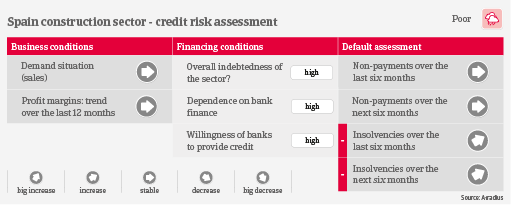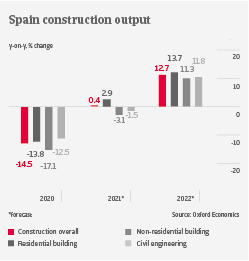Construction insolvencies have started to increase again


After a 14.5% contraction in 2020, Spanish construction output is forecast to grow only about 0.5% in 2021, but to rebound strongly by 13% in 2022. Residential building and civil engineering are expected to drive the recovery. The Next Generation EU fund will support large investments in projects with a sustainability aspect. However, commercial construction activity will remain hampered by subdued investment in retail and office buildings. Spanish construction is forecast to reach its pre-pandemic levels in Q4 of 2022.
After increasing over the past 12 months, profit margins of businesses have started to deteriorate due to higher commodity, transportation and energy prices. Currently, many contracts do not contain escalation clauses allowing builders to pass on prices. This has a negative effect on the credit risk situation of smaller businesses (contract renegotiations are ongoing with both private and public customers). Shortage of building materials and lack of skilled labour have already led to project delays and postponements, mainly in the residential construction segment.
During the pandemic, the gearing of construction companies has increased. Banks have provided loans backed by guarantees from the Spanish government, with grace periods of 1-2 years. However, highly indebted smaller companies could face limited access to new financing in the future. Payments in the construction industry take about 100 days on average, with mainly larger companies asking for extended payment terms.
Non-payments have remained stable over the past 12 months, mainly due to strong government stimulus. However, insolvencies, mainly of small businesses, have started to increase, and are expected to rise further in the coming months. We could see a significant rise in early 2022, depending on the expiry of stimulus measures, the ending of grace periods for bank loans, and the speed of disbursement of EU funds. Due to this uncertainty, along with the high gearing of businesses and the ongoing pressure on margins, our underwriting stance remains more restrictive for the time being, in particular for smaller businesses active in the residential construction segment.
Related documents

1.06MB PDF
